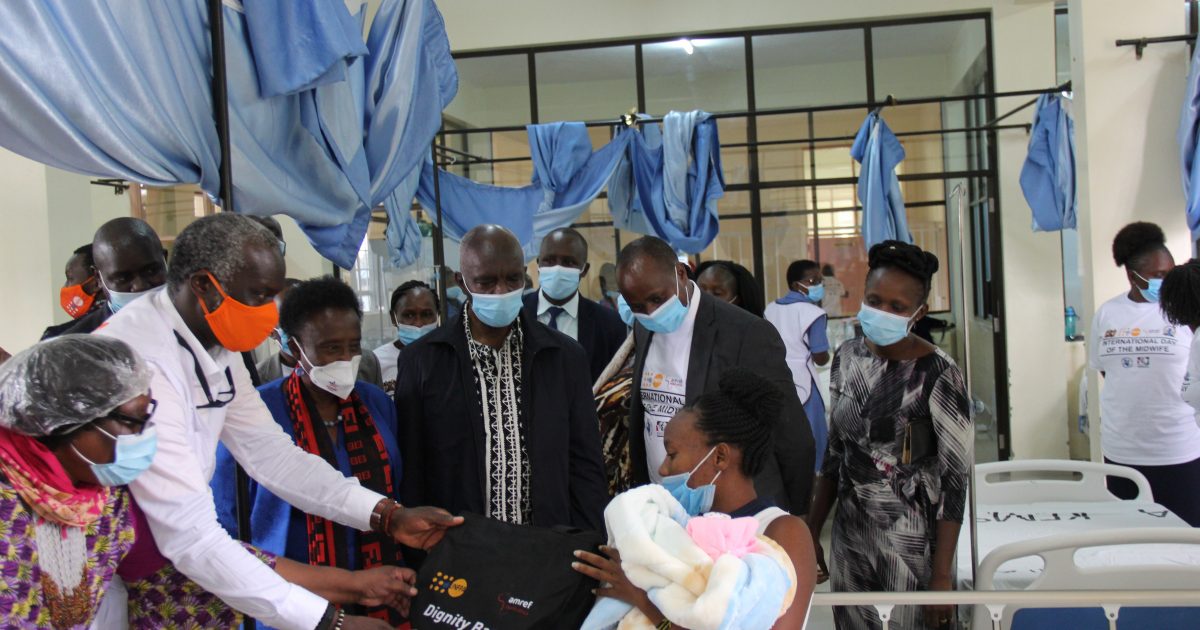Chair of the Midwives Association of Kenya, Louisa Muteti has called for the provision of pre-conception care services in all health facilities across the country to curb maternal and neonatal mortality and morbidity.
Muteti said preconception care can help identify biological, medical and social risks to a couple’s health for prevention and management leading to improved maternal and neonatal outcomes.
She challenged the National Health Insurance Fund (NHIF) to include pre-conception care services in its cover to reduce maternal and child mortality and morbidity. “Preconception care is a very effective way of preventing stillbirths and pre-term babies. County governments should also be encouraged to roll out universal health care covers that offer pre-conception care services,” said the midwives chair.
Speaking at Makueni Mother and Child facility in Wote town during the International Day of Midwives, Muteti said more than 30 million pregnancies occur daily globally but only 19 million become viable. “Preconception care can help reverse the trend through proper management and care,” she said
She underscored the critical role played by midwives in health promotion and asked both the national and county governments to invest in training of midwives. ‘‘I kindly request the Kenya Medical Training College (KMTC) management to roll out a midwifery program that aims at training and equipping midwives with the necessary skills and knowledge for improved reproductive health,’’ she added.
United Nations Population Fund’s (UNFPA) Representative for Kenya Dr. Ademola Olajide speaking at the same event emphasized on the need of investing in midwives in the country for improved health outcomes.
Olajide decried Kenya’s high maternal mortality ratio of 362 per 100,000 and a neonatal mortality rate of 22 per 1,000 and reiterated UNFPA’s commitment in reversing the trend.

Olajide further disclosed that shortage of midwives not only in Kenya but across the world was one of the main challenges affecting health outcomes. “There is a shortage of 900,000 midwives globally, where the trend is highly prevalent in Kenya. There are only 0.4 midwives per 10,000 population which is below the World Health Organization (WHO) recommendation of 23 nurse/midwives and doctors per 10,000 population,” he said.
The UNFPA representative said midwives played a very critical role and can deliver about 90 per cent of the essential sexual reproductive health, maternal, newborn and adolescent health interventions if provided with education and an enabling environment.
According to the 2021 State of the World’s Midwifery report launched last week by UNFPA, the World Health Organization and the International Confederation of Midwives affirms that increasing the number of midwives and the quality of care they provide could save an estimated 4.3 million lives a year by 2035.
The UNFPA representative however decried harmful and outdated gender norms on midwifery where their role and caring for women and newborns is widely undervalued across society.
“Midwives deserve greater investment in their capabilities, and workplaces that empower them and fully acknowledge their skills and contributions. They should be accorded a greater role in professional leadership to drive advancements in health policies and service delivery”, added Olajide.
He called on national and county governments, civil society and the development partners to join hands in strengthening midwifery in order to reach the goal of zero preventable maternal deaths by 2030.
Speaking at the same event Makueni Governor Kivutha Kibwana said his government has since 2013 increased the number of midwives in the county from 330 to 776.
Kibwana said besides increasing the number of midwives, his government has also invested in capacity building of midwives on basic emergency maternal and new-born care with more than 524 midwives trained since 2014.‘‘The investments have resulted in improved maternal and new-born indicators with skilled birth attendance rising from 46 percent in 2014 to 88.6 percent in 2020 while live births have almost doubled from 10,503 to 19,807 under the same period,’’ said the governor.
By Roselyne Kavoo and Ronald Rono




